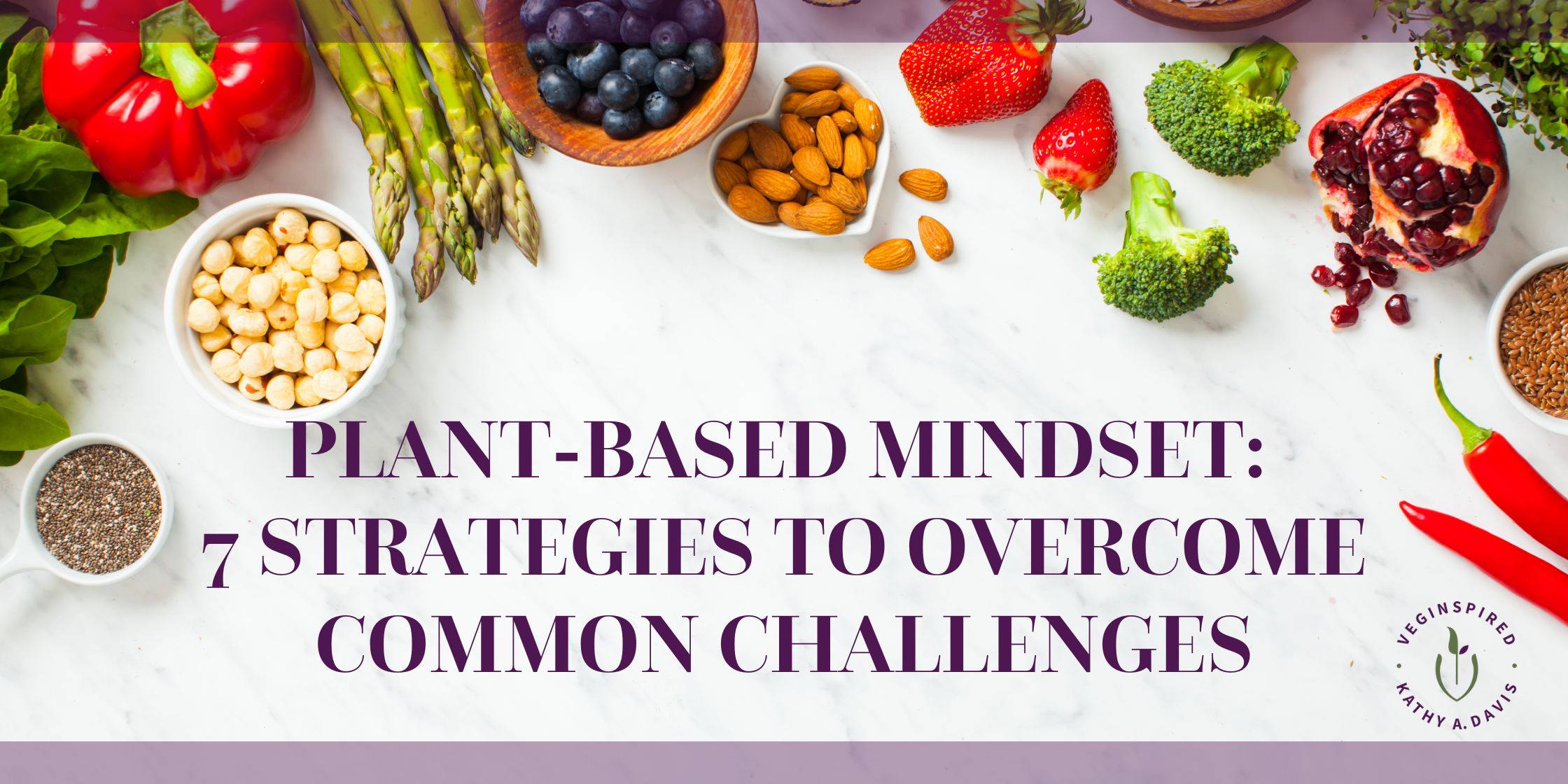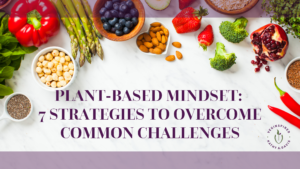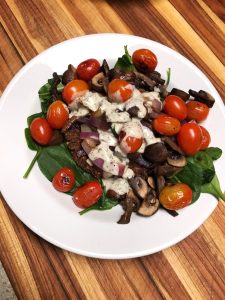
Plant-Based Mindset: 7 Strategies to Overcome Common Challenges

Mindset. What is mindset? Mindset is defined as ‘a person’s attitude, beliefs, or way of thinking about something.’ In the context of a plant-based lifestyle, your mindset encompasses your attitude, beliefs, and way of thinking about plant-based eating, living, and related choices.
Plant-Based Mindset: 7 Strategies to Overcome Common Challenges
Why is mindset crucial when adopting a plant-based diet or making any significant lifestyle change? I’ve observed that your mindset profoundly impacts your success. For example, if you approach plant-based eating as a restrictive ‘diet,’ you’re more likely to restrict yourself, feel forced, ‘cheat,’ and ultimately abandon it once you reach a goal or encounter an obstacle (like a vacation). This pattern stems from your attitude, beliefs, and how you define ‘diet.
However, if you embrace plant-based eating as a new way of living and cultivate an attitude and belief system that supports this shift, the transition becomes easier and more intuitive. This involves integrating plant-based choices into your life, making supportive changes, and proceeding with intention, excitement, and grace
Let’s explore 7 Strategies you can use right now to shift your mindset into that of a plant-based mindset.
1. Overcoming Plant-Based Perfectionism: Embrace Intention, Not Perfection
Shifting your focus to intentional habits that are plant-based and that align with your plant-based goals, can help you remove the focus on perfection. Many people fall prey to the perfectionist mindset which can create additional obstacles and lead to wavering in this dietary change. Instead, focus on making intentional decisions with every bite you take. And when you do consume something that may not fully align with your plant-based goals, give yourself a little time to reflect and explore what made you decide to do that. Was it intentional? accidental? or an old habit coming back?
2. Conquering Self-Doubt: Building Confidence in Your Plant-Based Journey
Building confidence in your plant-based journey starts with taking action. As you move along your plant-based path, you encounter different situations, new recipes, new cooking methods, and all of these experiences help to build your confidence. Each time we step outside of our comfort zone and we take action, we see that we can do it. Confidence is built by taking action, not by consuming more information. Today, commit to take some action toward plant-based eating!
3. Navigating Social Pressure: How to Stay True to Your Plant-Based Values
The key word in this strategy title is values. The definition of values is ” principles or standards of behavior; one’s judgment of what is important in life.” To navigate social pressure, it is important to clearly define your values and what is important in your life. For many of us, eating plant-based is for health, vitality, and/or longevity. When you are approached in a social situation with question or judgment on your dietary choices; the first thing to do is use breathing techniques to calm and ground yourself and then calmly articulate that these dietary choices are important to you for xyz reasons (and list your reasons). Now, many people say that you can ignore social pressure, or avoid social pressure, and while that is true – we are meant to be community “tribal” beings. We thrive on social connection, so, in my opinion, it is better to focus and ground yourself into your values and standards of eating plant-based when in social situations. A good start with this strategy is to journal or reflect on what these new standards and values are for you and why they are so important in your life.
4. Breaking Free from Old Habits: Creating Sustainable Plant-Based Routines
Going plant-based as an intentional dietary lifestyle change, means you are going to need to change your habits and routines. And while this article can’t dig into the depth of our habits and routines in our subconscious mind, I do want to give you a practical strategy to identify old habits and patterns and confront them. One way to do that is to audit your daily behavior (I go much more in depth with this in our 12-Week VegInspired Way Course in the Successfully Plant-Based Membership). With your audit, you want to look at routine behaviors and thoughts. For example, are you someone who feels they need to clear their plate even if they are full? If so, can you trace that thought back to where it started? Perhaps as a child you were told to clear your plate… and so all your life you have developed the habit of clearing your plate. Now you want to be able to eat until you are full, and be okay saving the rest as leftover for tomorrow. When we work to break free from old habits, the best way to do it is to trace back the habit and rewrite that belief or thought to the new one we want. My favorite quote to illustrate this is from Socrates, “The secret of change is to focus all of your energy, not on fighting the old, but on building the new.” Which can help us remember to focus our energy and intentions on creating the new habits while overriding the old.
5. Dealing with Cravings: Mindset Techniques for Food Choices
Cravings are real. I’ve found that when I eat balanced plant-based meals with enough starchy foods (potatoes, whole grains, beans) to satisfy me, I have less cravings. But the salty and sweet cravings do hit. When they do, I use a mindset technique called reframing. Most times, my cravings are more food associations, so reframing what I associate with certain foods or in certain situations has helped tremendously shift my cravings. For example, maybe in the winter you crave cozy comfort foods, and in past you would have satisfied that craving with big pasta dishes or meat heavy soups or stews. Knowing that your mindset is your attitude or beliefs about something, you start to reframe what cozy comfort foods look like to you – you look for plant-based lasagna dishes or pasta dishes that better align with your goals, you look for bean and grain stews or soups, you find delicious gravy recipes to eat with your simple plant-based mashed potatoes. Through these reframes you are able to bring your new standards and goals in and satisfy your cravings.
6. Preventing Plant-Based Burnout: Long-Term Mindset Strategies
One of my biggest tips for preventing burnout – or what I call “food fatigue” is through variety. I have lead several Meal Planning Sessions in our Successfully Plant-Based Membership on planning for variety, because I think it is natural to get comfortable with foods and then eventually get burned out on them and make radical decisions – like bingeing on vegan processed foods because you are tired of your 100th dinner of beans and rice. Variety with plant-based eating can look a lot of different ways; but one thing you can do today is take a look at your favorite meals or the meals you eat on repeat and ask yourself, “how can I make a very simple change to this meal?” Some examples might be, switching up fruits in your baked oatmeal, or making a new plant-based sauce for your rice and veggie meal, or cooking your potatoes a different way (boiling instead of roasting). Oftentimes, the simplest change can reinvigorate us or keep a meal “fresh.”
7. Taking Action: Developing a Proactive Plant-Based Mindset
Action! Action! Action! One of the biggest mistakes I see people in my community make is overconsumption with no action. I see people read the books, take the workshops, watch the youtube videos, but never take action. Information without action is useless. Action is the doing… it is the buying the plant-based ingredients, cooking the plant-based ingredients, and eating the plant-based ingredients. It isn’t perusing a cookbook, or watching a recipe video online. It isn’t pinning new recipes to your boards or reading a blog post. Action is the doing, it is the movement, it is implementation of the information learned. It is putting what you read, hear, and watch to the test and doing it. I have a FREE 90 minute workshop coming up on this very topic (Register Here). The entire workshop will be designed to help you create an action plan so you can start living plant-based right away!
In Conclusion
Cultivating a strong plant-based mindset is essential for long-term success. By embracing intention, building confidence, navigating social situations effectively, breaking free from old habits, managing cravings, prioritizing variety, and taking consistent action, you can empower yourself to thrive on a plant-based journey. Remember, this is about more than just food; it’s about a holistic shift in your approach to life.
Join me in my upcoming workshop to create your personalized action plan and begin your journey today!


